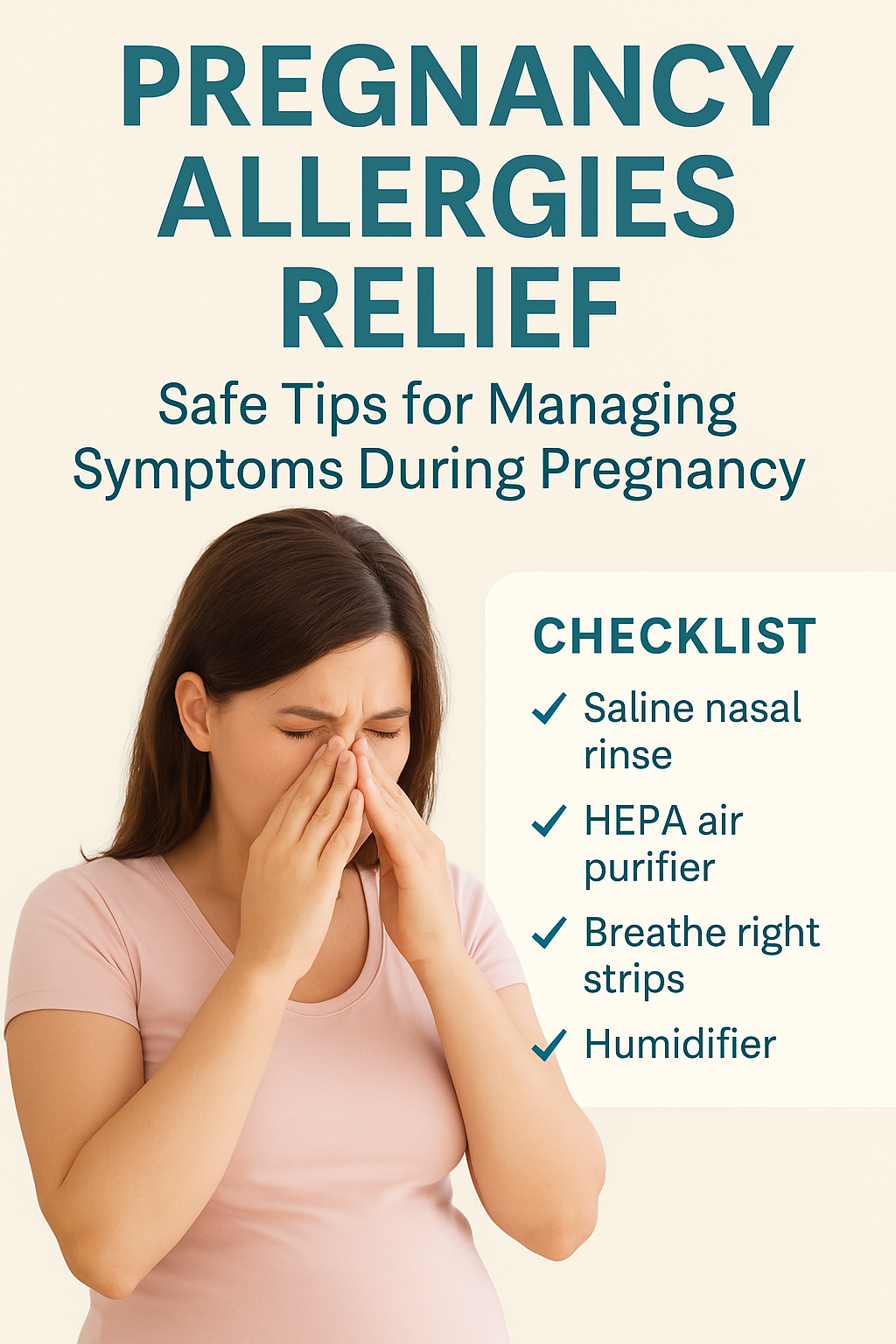Pregnancy Allergies Relief: Safe Tips to Manage Symptoms During Pregnancy
Pregnancy is full of surprises—but sneezing fits, itchy eyes, and nonstop congestion? That’s one twist you probably didn’t expect. If you’re struggling with seasonal or year-round allergies while growing a tiny human, you’re not alone. Many women experience allergy flare-ups (or notice allergies for the first time) during pregnancy. The good news? Pregnancy allergies relief is possible—with safe, smart strategies that protect both you and your baby.
This comprehensive guide walks you through everything you need to know, including safe treatments, natural remedies, lifestyle tips, and must-have products for allergy comfort.
Heads up: This post may include affiliate links. As an Amazon Associate, I earn from qualifying purchases—at no extra cost to you. Full privacy policy and disclosure here.
Why Do Allergies Feel Worse During Pregnancy?
Pregnancy changes nearly everything in your body—including your immune response. Your body might:
- React more strongly to allergens you used to tolerate.
- Trigger allergy-like symptoms due to increased blood volume and hormonal shifts.
- Experience pregnancy rhinitis, a condition that mimics allergies with nasal swelling and congestion.
Understanding these changes is the first step toward finding effective pregnancy allergies relief that doesn’t compromise your baby’s safety.
Need help keeping a positive mindset? These positive birth affirmations can calm your nervous system and reduce allergy-related stress.
Common Allergy Triggers During Pregnancy
You might be reacting to:
- Pollen from trees, grasses, and weeds
- Pet dander
- Dust mites
- Mold spores
- Food allergens (nuts, shellfish, dairy, etc.)
- Fragrance and chemical irritants
Pro tip: If you’re unsure what’s triggering your symptoms, consider an allergist visit after your first trimester, or stick with general relief strategies in the meantime.
Safe Pregnancy Allergies Relief Methods
Let’s talk about what actually works—and what’s safe.
1. Saline Nasal Rinse
A non-medicated rinse helps flush out allergens and soothe nasal passages.
👉 Try This: NeilMed Sinus Rinse Kit — an easy, drug-free way to breathe better.
Check off everything in your third trimester to-do list so you’re not scrambling while managing allergy symptoms.
2. Use a HEPA Air Purifier
Filtering indoor air reduces exposure to dust, pet dander, and pollen.
👉 Try This: Honeywell HEPA Air Purifier for bedrooms and nurseries.
3. Breathe Right Nasal Strips
Perfect for nighttime congestion.
👉 Try This: Breathe Right Nasal Strips – drug-free and pregnancy-safe.
4. Pregnancy-Safe Antihistamines
According to the American College of Obstetricians and Gynecologists (ACOG), the following are generally considered safe during pregnancy (ask your doctor first!):
- Loratadine (Claritin)
- Cetirizine (Zyrtec)
Avoid anything with pseudoephedrine unless explicitly approved by your OB.
5. Humidifier for Dry Air
Dry air can irritate sinuses. A humidifier keeps the air moist and reduces congestion.
👉 Try This: LEVOIT Ultrasonic Humidifier
If you’re exploring natural care options, here’s how to avoid chemicals in baby care.
Natural Pregnancy Allergies Relief Options
If you’re going drug-free during pregnancy, here are gentle alternatives:
- Neti Pot with warm distilled water
- Steam inhalation (shower or bowl + towel method)
- Honey (local raw honey may reduce pollen sensitivity)
- Vitamin C (natural antihistamine properties—check with your doctor before supplementing)
- Eating anti-inflammatory foods like ginger, garlic, and turmeric
Need a laugh or inspiration? Browse these top parenting blogs
Tips to Reduce Allergen Exposure
Sometimes the best relief comes from prevention:
- Shower and change clothes after being outdoors
- Keep windows closed during high pollen days
- Use allergy-proof pillow covers
- Vacuum often with a HEPA filter vacuum
- Keep pets out of the bedroom
- Avoid scented cleaning products
Sharing your needs? Here’s how to tastefully let others know about your baby registry.
Pregnancy-Safe Allergy Relief Products on Amazon
Here are additional comfort tools worth checking out:
- Zarbee’s Natural Cough Syrup + Mucus Relief – safe, gentle, and free of alcohol or dyes
- Munchkin Warm Mist Humidifier – baby- and pregnancy-friendly
- Frida Mom Breathe Frida Vapor Wipes – soothing, menthol-free
- AllerEase Hypoallergenic Mattress Protector – keeps allergens at bay
- Claritin 24-Hour Non-Drowsy Tablets – OB-approved (with guidance)
While sneezing and sniffling may not be fun, here are creative ways to enjoy your pregnancy.
FAQ: Pregnancy Allergies Relief
Can allergies get worse during pregnancy?
Yes, hormone shifts can increase nasal inflammation, making pre-existing allergies worse—or triggering new ones.
Is it safe to take antihistamines while pregnant?
Many antihistamines (like loratadine and cetirizine) are considered safe during pregnancy but should only be taken under your doctor’s supervision.
What are natural remedies for allergy relief during pregnancy?
Saline rinses, steam inhalation, honey, and HEPA filters are safe and effective options for many moms.
Will my baby develop allergies if I have them?
There is a genetic link to allergies, but environmental exposure and breastfeeding can influence outcomes. A varied, healthy diet during pregnancy may help.
Should I avoid all allergy medications?
Not necessarily. Some medications are approved for use during pregnancy—your OB or midwife can guide you based on symptom severity.
Conclusion
Finding pregnancy allergies relief doesn’t have to feel overwhelming. With a mix of smart prevention, gentle remedies, and pregnancy-safe medications, you can breathe easier and focus on what really matters—growing that sweet baby.
📌 Save This Guide for Later!
Pin this post on your Pregnancy Health or Self-Care board so you can reference these pregnancy allergies relief tips anytime.

💬 What Helped You Most?
Drop a comment below to share what’s worked for you—and help other moms-to-be find the relief they need too!
